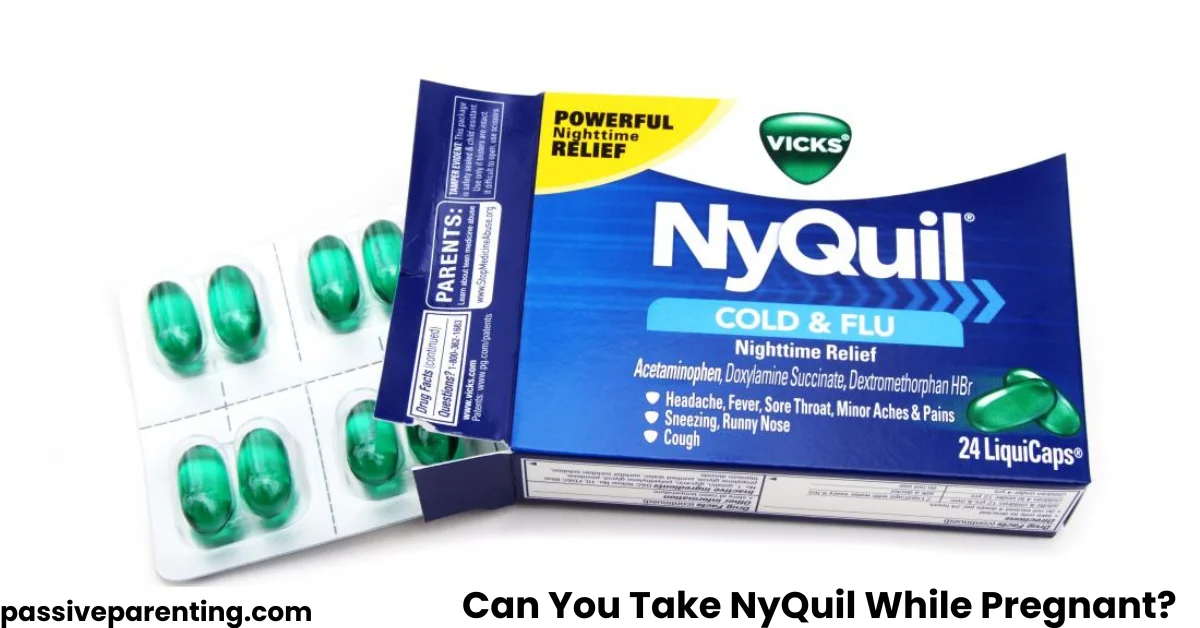Many expectant mothers face the dilemma: when a cold or flu strikes, is it safe to reach for over-the-counter remedies like NyQuil? The phrase “can you take NyQuil while pregnant” encapsulates this concern. Because NyQuil often contains multiple active ingredients, some of which raise safety questions during pregnancy , it’s essential to understand what current evidence and medical guidance say.
Understanding NyQuil’s Ingredients
Before assessing safety, it’s crucial to know what’s inside common NyQuil formulations. Different versions exist (e.g., original, severe, alcohol-free), so always check the label.
Typical active ingredients in NyQuil include:
- Acetaminophen (analgesic / fever reducer)
- Dextromethorphan (cough suppressant)
- Doxylamine (a sedating antihistamine)
- Phenylephrine (a decongestant in some versions)
- Alcohol (ethanol) — present in some liquid formulations
Let’s look at each and their pregnancy implications.
Acetaminophen
Acetaminophen is often considered one of the safer pain/fever relief options during pregnancy. The American College of Obstetricians and Gynecologists (ACOG) reaffirms its status as a first-line analgesic and antipyretic in pregnancy.
However, like all drugs, it’s meant for short-term, minimal effective dosing. High or prolonged use has raised speculative concerns in some observational studies, though causality hasn’t been established.
Dextromethorphan
Dextromethorphan is a common cough suppressant. Available data do not suggest a strong association with congenital malformations, making it a relatively lower-risk option when needed.
Still, it should only be used when symptom relief justifies it, and formulations without alcohol or other risky additives are preferred.
Doxylamine
Doxylamine is a sedating antihistamine. It has a long history of use during pregnancy, especially in combination with vitamin B6 for nausea and vomiting (i.e. doxylamine/pyridoxine).
Animal and human data suggest low risk of birth defects when used appropriately.
Nonetheless, sedation, dry mouth, or dizziness are possible side effects to monitor.
Phenylephrine (Oral Decongestant)
Some NyQuil versions include phenylephrine to relieve nasal congestion. This ingredient is more contentious in pregnancy:
- Phenylephrine constricts blood vessels, which raises concerns about reduced placental blood flow.
- Human studies suggest possible increased risk of birth defects, particularly early in pregnancy.
- Because of the risk and limited efficacy of oral phenylephrine as a nasal decongestant, many sources recommend avoiding it when pregnant.
Alcohol (Ethanol)
Some liquid NyQuil formulations contain alcohol (often ~10%). Alcohol during pregnancy is known to cross the placenta and may contribute to fetal alcohol spectrum disorders.
Given that no safe level of alcohol consumption in pregnancy has been established, formulations containing alcohol are usually discouraged.
What Authorities and Medical Literature Advise
Looking at consensus and evidence helps us interpret risks and benefits.
Drugs.com Medical Review
Drugs.com cautions that many NyQuil formulas include phenylephrine and alcohol, both potentially harmful during pregnancy and recommends consulting a provider before use.
They further note that you may not need all active components in a multi-symptom product (e.g. if you only have a cough).
InfantRisk / Infantrisk
In a comprehensive review of cold and flu management in pregnancy, Infantrisk notes that:
- Dextromethorphan in non-alcohol products appears relatively safe
- Doxylamine has a favorable safety history
- Phenylephrine (oral) has less favorable safety evidence and should be used cautiously, especially early in pregnancy
- Non-medical options (humidifiers, saline, nasal sprays) are preferred first-line when feasible.
Peer-Reviewed Review on OTC Cold Medications
A review published in PMC (NCBI) suggests that short-term use of over-the-counter cold medicines, under supervision, can be reassuring for pregnant women with mild symptoms.
The review emphasizes the importance of using the minimum effective dose for the shortest duration necessary.
Can You Take NyQuil While Pregnant? The Bottom Line
Given the ingredients and evidence:
- Some NyQuil formulations (especially those containing alcohol or phenylephrine) pose risks and are best avoided.
- Others (alcohol-free versions without decongestants) may be safer, especially in the second or third trimester, but should never be used without consultation.
- Always balance benefits (symptom relief, comfort, sleep) against theoretical risks.
- The decision should be individualized, based on trimester, symptom severity, maternal health conditions, and fetal risk.
In essence: Yes, but cautiously and only under guidance, depending on the NyQuil variant.
Safer Alternatives & Non-Drug Strategies
Rather than a full multi-symptom medicine, it’s often safer to target specific symptoms using options backed by better safety data.
Safer Medications Pregnant Doctors Often Approve
- Acetaminophen for pain, aches, fever (considered a relatively safe first-line analgesic in pregnancy).
- Dextromethorphan (non-alcohol versions) for cough relief.
- Doxylamine — when sedation or nighttime symptom relief is needed.
- Nasal decongestants (topical) like oxymetazoline spray (used for short durations) — less systemic absorption, so lower fetal exposure.
- Saline nasal sprays, humidifiers, steam inhalation, and rest/fluids.
Non-Drug Measures You Can Try First
- Drink warm fluids (herbal teas, broths)
- Use a cool-mist humidifier or vaporizer
- Inhale steam (over a bowl of hot water, draped towel)
- Use saline nasal spray or rinse (Neti pot)
- Sleep with head elevated, keep nasal passages open
- Honey and lemon (for throat/cough, if your healthcare provider approves)
- Rest and good nutrition to support immune function
These supportive measures often reduce symptom burden without introducing drug risks.
When to Seek Medical Attention
If you experience:
- High, persistent fever (> 38.5 °C / 101.3 °F)
- Shortness of breath, chest pain
- Wheezing, rapid heartbeat
- Severe dehydration
- Flu-like symptoms worsening beyond a few days
- Other signs of complication (e.g. reduced fetal movement later in pregnancy)
…you should contact your obstetric provider or visit urgent care. Sometimes prescription antivirals or other interventions may be needed.
Trimester Considerations & Risk Timing
Risks vary by stage of pregnancy.
- First trimester — when organ formation occurs, exposures carry higher theoretical risks. Be extra cautious with decongestants and novel combinations.
- Second trimester — somewhat safer window, but avoid prolonged use of riskier ingredients.
- After 20 weeks — be mindful of medications that affect fetal kidney function or amniotic fluid levels (e.g., NSAIDs).
Even in safer windows, using the lowest effective dose for the shortest time remains best practice.
Tips for Using Medication Safely During Pregnancy (if your doctor agrees)
- Read the label every time — formulations change, and some NyQuil versions may contain ingredients you wish to avoid.
- Avoid multi-symptom formulas when you don’t need every component.
- Start with non-drug measures first.
- Use single-symptom medicines (e.g. just a cough syrup) instead of all-in-one products.
- Keep track of cumulative doses (especially with acetaminophen, as many products contain it).
- Monitor how you and the baby respond, and report any unusual symptoms.
- Discuss with your obstetrician or pharmacist before taking new OTC drugs, especially in high-risk pregnancies or with underlying conditions.
Case Scenarios (Hypothetical Examples)
| Scenario | Recommended Approach | Why |
|---|---|---|
| You’re in 2nd trimester, have body aches and mild cough | Use acetaminophen (short-term) + dextromethorphan (non-alcohol version) + humidifier | Limits unnecessary exposure to extra agents |
| You found an older bottle of NyQuil (contains alcohol) | Avoid using it. Consult your doctor. | Alcohol is generally avoided in pregnancy |
| You have nasal congestion only | Try saline or short-term oxymetazoline spray first | Less systemic absorption, safer alternative |
Limitations, Gaps & Caution Notes
- Many combination products, including NyQuil, haven’t been studied exhaustively in pregnancy, especially as a whole formula.
- Observational and retrospective studies may have confounding factors; causation is often uncertain.
- Even “safe” ingredients can carry risk at high doses or prolonged use.
- Genetic or individual factors may alter sensitivity.
- Always consider maternal benefits (relief, rest, lower fever) vs potential fetal risks — sometimes relieving a high fever is safer for the baby than allowing it to persist.
Conclusion
Catching a cold or the flu during pregnancy can feel overwhelming, but careful choices can keep both you and your baby safe. The key question can you take NyQuil while pregnant does not have a simple yes or no answer. NyQuil products contain a mix of ingredients, some (like acetaminophen, doxylamine, and dextromethorphan) generally considered low-risk when used as directed, and others (like phenylephrine and alcohol) that may pose concerns, especially in early pregnancy.




